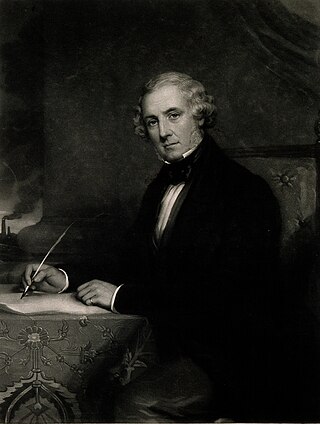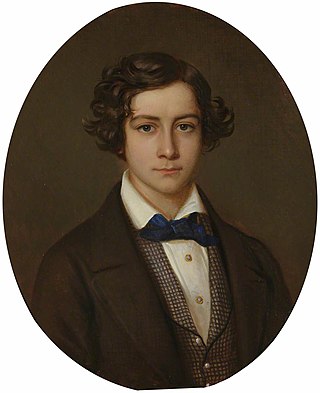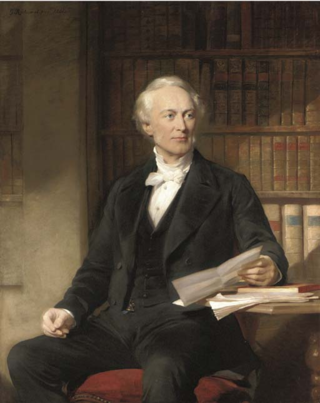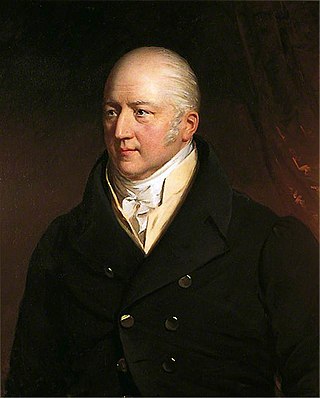
Edward Venables-Vernon-Harcourt was a Church of England bishop. He was the Bishop of Carlisle from 1791 to 1807 and then the Archbishop of York until his death.

Sir Josiah John Guest, 1st Baronet, known as John Josiah Guest, was a British engineer, entrepreneur and politician.

Sir George Clerk of Pennycuik, 6th Baronet was a Scottish politician who served as the Tory MP for Edinburghshire, Stamford and Dover.
Newport was a parliamentary borough located in Newport, which was abolished in for the 1885 general election. It was occasionally referred to by the alternative name of Medina.
Wigtown Burghs, also known as Wigton Burghs and Wigtown District of Burghs, was a constituency of the House of Commons of the Parliament of Great Britain from 1708 to 1800 and of the House of Commons of the Parliament of the United Kingdom from 1801 to 1885. It was represented by one Member of Parliament (MP).
This article about records of members of parliament of the United Kingdom and of England includes a variety of lists of MPs by age, period and other circumstances of service, familiar sets, ethnic or religious minorities, physical attributes, and circumstances of their deaths.

Sir Charles Wetherell was an English lawyer, politician, and judge.
The Hon. George Ponsonby, was an Irish politician, who served as a Junior Lord of the Treasury in the governments under Earl Grey and Lord Melbourne from 1832 to 1834.

Sir Robert Fitzwygram, 2nd Baronet, FRS, born Robert Wigram, was a Director of the Bank of England and a Tory politician.

Philip Henry Muntz was a British businessman and Liberal politician. He was a leading figure in the politics of the rapidly growing industrial town of Birmingham in the mid-nineteenth century.

Sir Richard Biddulph Martin, 1st Baronet was an English banker and Liberal Party politician.

Frederick Thellusson, 4th Baron Rendlesham DL, was a British Conservative Party politician.

William Scholefield was a British businessman and Liberal politician. He was a leading figure in the politics of the rapidly growing industrial town of Birmingham in the mid-nineteenth century, serving as the first mayor in 1838–39, and one of the constituency's two Members of Parliament from 1847 to 1867.
John Ivatt Briscoe was an English Whig and later Liberal politician who sat in the House of Commons from 1857 to 1870.

Sir Herbert George Denman Croft, 9th Baronet, DL, was an English Conservative Party politician who sat in the House of Commons from 1868 to 1874.

Octavius Wigram was an English businessman and ship owner in the City of London, a member of Lloyds and Governor of the Royal Exchange Assurance Corporation.
The National Association for the Protection of British Industry and Capital was founded in May 1849 by the English shipbuilder and politician George Frederick Young as a pressure group advocating protectionism. The historian Anthony Howe has written that Young "was ready to woo earls, dukes, farmers, seamen, and the Chartist National Association of Organised Trades. He forced Benjamin Disraeli into a defensive position and became for a time a vital force in the protectionist politics of the late 1840s and early 1850s".
Colonel John Campbell, of Shawfield and Islay was a Scottish soldier in the British Army. After his early death, his widow Lady Charlotte Bury achieved fame as a diarist and novelist. He was also briefly a politician.

Joseph Marryat was an English West India merchant and banker, serving as an MP for Sandwich from 1812 until his death in 1824. He was a slave-owner and a strong opponent of abolitionism.

Matthew Russell of Brancepeth Castle was an English landowner and coal proprietor, inheriting from his father William Russell a large fortune. He went into politics, first as a Pittite Tory, holding the Saltash seat in parliament for the last 20 years of his life, with one short break.













